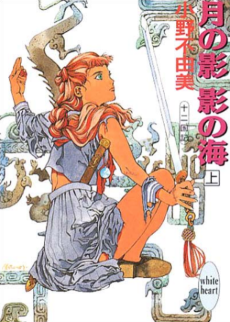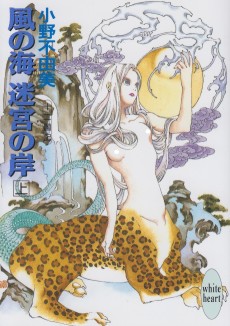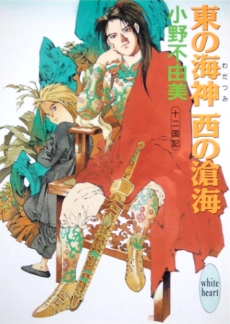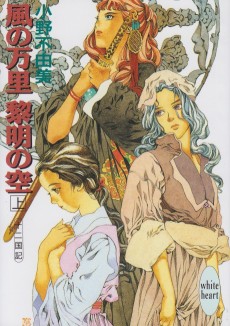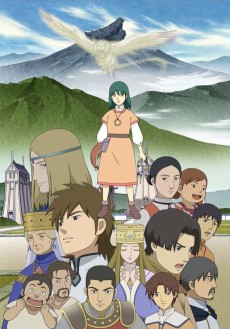JUUNI KOKUKI
STATUS
COMPLETE
EPISODES
45
RELEASE
August 30, 2003
LENGTH
25 min
DESCRIPTION
Nakajima Youko is your average somewhat timid high school student. One day, a strange man named Keiki appears before her, swearing allegiance. Before she could properly register what was happening, demon-like creatures attack Youko and her friends, after which they are pulled into a different world. A world unlike what she has ever known. Separated from Keiki, Youko and her friends must do whatever they can if they wish to survive in this new world.
CAST
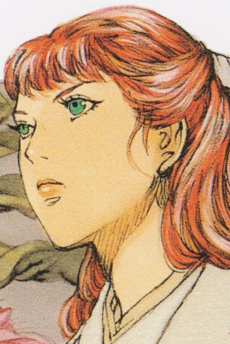
Youko Nakajima
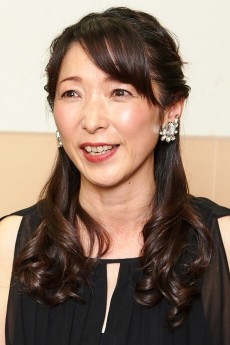
Aya Hisakawa
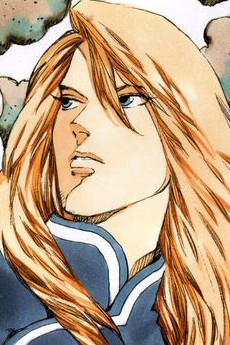
Keiki
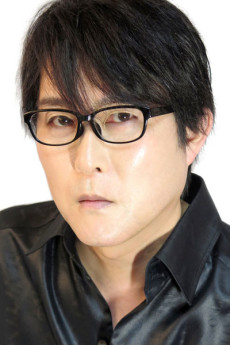
Takehito Koyasu
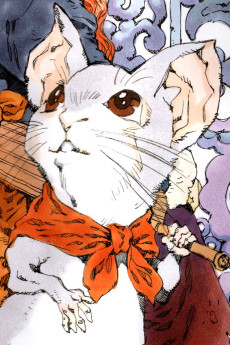
Rakushun
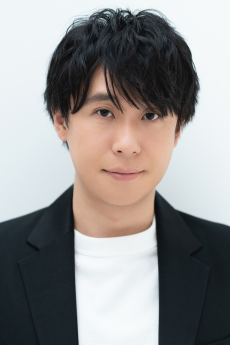
Kenichi Suzumura
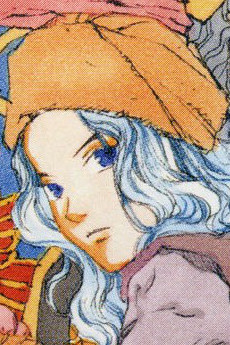
Shoukei

Houko Kuwashima
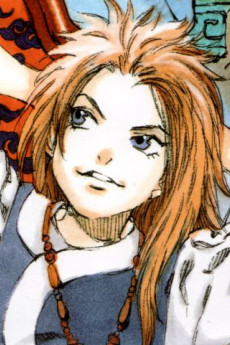
Enki
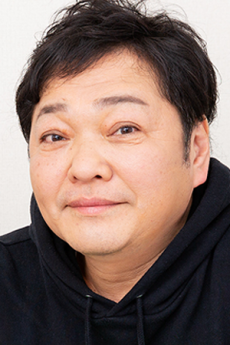
Kappei Yamaguchi
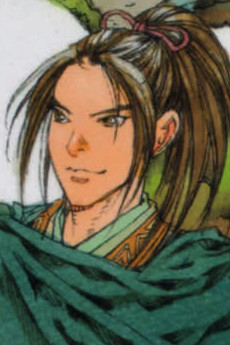
Shouryuu
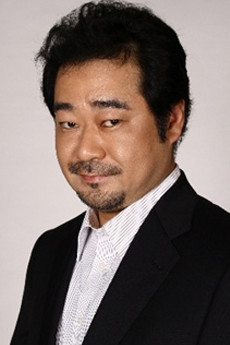
Masaki Aizawa
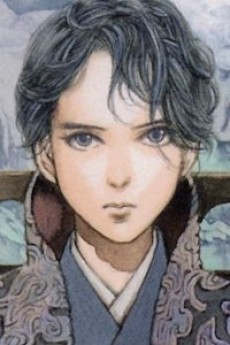
Taiki
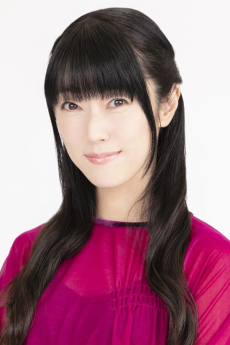
Rie Kugimiya
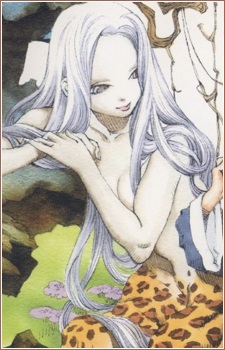
Sanshi Haku
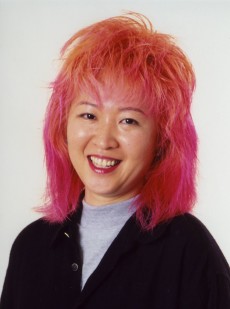
Masako Katsuki
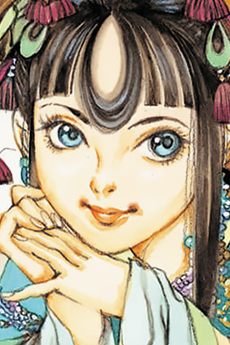
Shushou
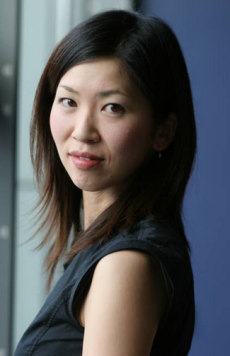
Wakana Yamazaki
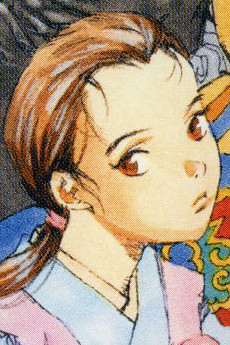
Suzu Ooki
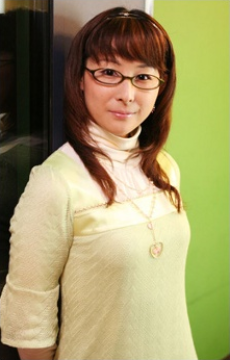
Naomi Wakabayashi
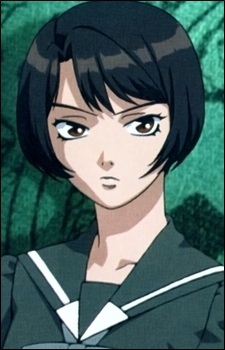
Yuka Sugimoto

Aya Ishizu

Aozaru
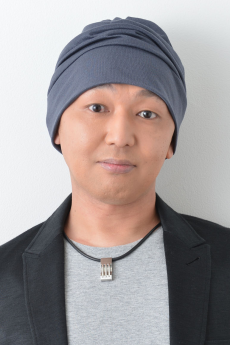
Kousuke Okano

Sekki
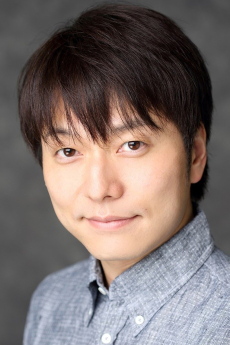
Kenji Nojima

Youka
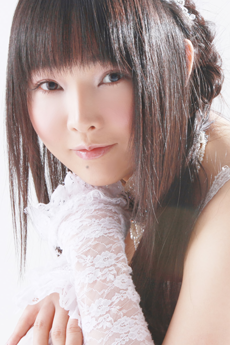
Yukana

Risai

Naomi Shindou

Kouya
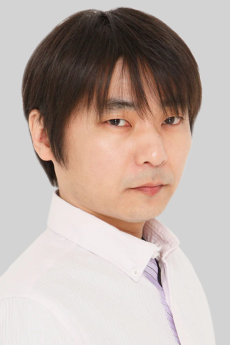
Akira Ishida
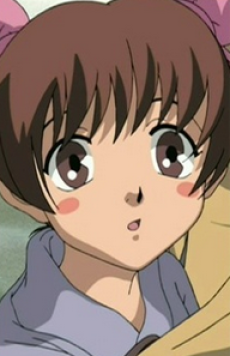
Gyokuyou
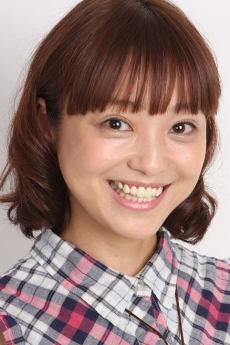
Tomoko Kaneda

Koshou
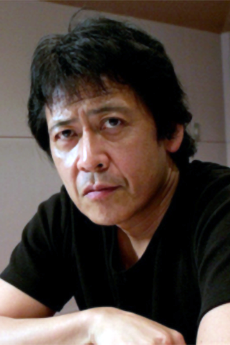
Rintarou Nishi

Enho
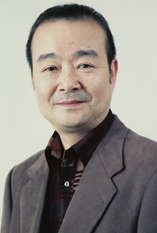
Tomomichi Nishimura
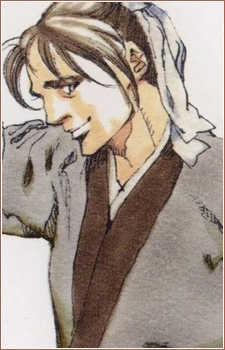
Kantai
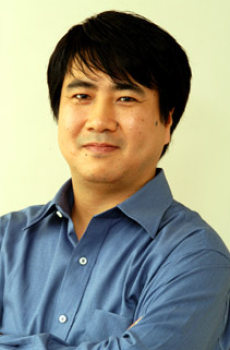
Yasunori Matsumoto
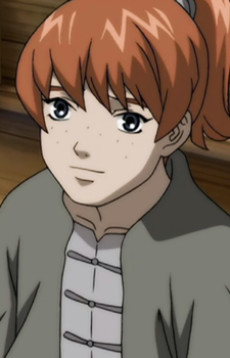
Seishuu
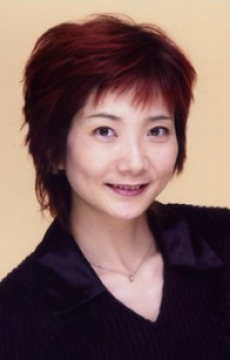
Akiko Hiramatsu

Ikuya Asano
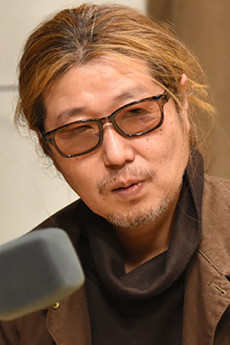
Yuuji Ueda
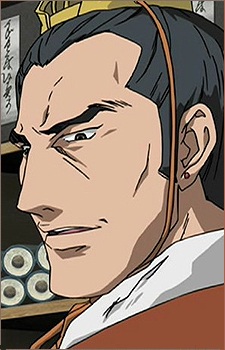
Shoukou

Tooru Ookawa

Kou-Ou
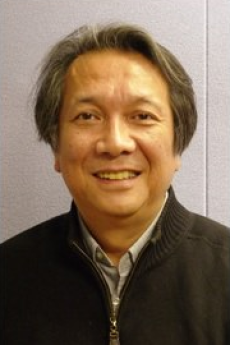
Takaya Hashi
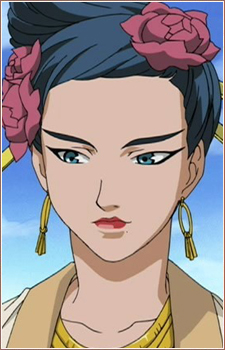
Riyou
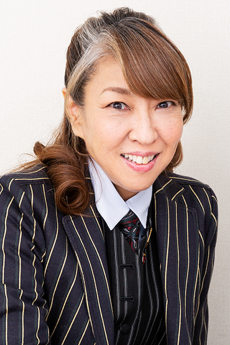
Minami Takayama
EPISODES
Dubbed
RELATED TO JUUNI KOKUKI
REVIEWS

TheRealKyuubey
80/100This could have been the best Isekai anime ever made, if it had continued.Continue on AniListYoko Nakajima is a timid, proper high school student with a lot of expectations on her plate. In her home life, her parents are strict, with nothing but the highest standards for her. Her school life is even worse, as she’s the class president, with teachers breathing down her neck and an entire class room looking up to her with equal parts pride and scrutiny. One day, a tall, mysterious stranger appears right in the middle of class, and kneels before her, proclaiming her to be his queen! Before she can explain this to her bewildered homeroom, a demon attacks, and chases the two of them to the school roof, where Yoko… Along with two of her supposed friends… are ripped from the world they know, and transported to a parallel world known as The Twelve Kingdoms!
Now, with a darker complexion and an altered face,Yoko is alone in a dangerous and unfamiliar world. Will she ever be able to find her friends, return home, or even figure out what in the world happened to her?
I haven’t really talked about Studio Pierrot before, at least not by name, but I’ve seen enough of their work to know that they have an abysmal track record when it comes to animation. They did Saiyuki, a show whose animation quality I blasted over a year ago, and if that’s not enough to deter you, they’re the company who produced Naruto. Yes, The Twelve Kingdoms comes from the same stock as the ugly, ugly ninja show where people jumping from tree to tree look like cardboard cut-outs on popsicle sticks. They’ve proven with Yuyu Hakusho that they DO know how to manage a low budget, and in 2014, they’ve proven with Tokyo Ghoul that they can, in fact, look amazing.
Well, Twelve Kingdoms is no Tokyo Ghoul, but Thank God, it’s no Naruto, either. The animation is definitely cheap, and there are some moments where the character artwork is so clumsy it will make you cringe, but for the most part, it looks passable. Passable, of course, does not mean good… Movements are stiff and seldom look natural, key frames are constant, characters frequently appear off model, and a lot of action scenes are dominated by speed lines. It’s a series from the early 2000s, but it looks like it’s from the mid nineties, is what I’m trying to say. It’s not all bad, though… There are several combat scenes that are solidly animated, but they’re the exception that proves the rule. Thoughtful angles and exquisite lighting are used to beautiful effect, however, and unlike several other shows I’ve seen, this never feels like the obvious compensation that it is. Great care was clearly taken with every shot, taking what could have been a jarring visual experience and making it a lot easier to swallow.
An equal amount of care was clearly taken with the dub, which is a surprise, since it was done by the infamous Media Blasters. Even their good dubs are tolerable at best, with some notable examples being Berserk and Squidgirl, so it may not be entirely a stretch to say that the dub for The Twelve Kingdoms could be their masterpiece. Taking liberally from the Pioneer stable of actors, they went with a grounded, natural sound, without a single ridiculous or exaggerated performance in sight.
Our main character is played by Dorothy Elias-Fahn, a prolific character voice actor who’s probably most well known for her performance of Meryl Strife from Trigun. Yoko is by far the most important role she’s ever had in any single project, and with that, it’s also likely the most screen time her voice has ever had. They couldn’t have cast her better, as Fahn carries every single stage of Yoko’s development with depth and sincerity, from a whimpering pushover all the way to the strong warrior she eventually becomes.
While the rest of the cast doesn’t perform quite as amazingly as Fahn, they’re still pretty much all outstanding. Much like His and Her Circumstances, Twelve Kingdoms’s dub is a veritable who’s who of classic actors, with some very well known names from Wendee Lee to Michael McConnohie popping up not only in named roles, but frequently in the background, as well. Karen Strassmen, Kate Higgins and Mela Lee play at their very best in complex supporting roles throughout the majority of the story, and their respective dynamics with Fahn are portrayed remarkably.
Now, the premise of this show isn’t exactly unique. High school girl gets magically transported to another world(resembling feudal Japan, of course) by a mysterious handsome stranger… Honestly, even I hesitated when I read it, and while the tone of the first few episodes had me hooked, I was still worried that all the familiar details would eventually lead down a path to the same old tropes that similar shows like Inuyasha, Fushigi Yugi, and Escaflowne have already trodden. But Twelve Kingdoms distinguishes itself from these titles by how stone cold serious it takes it’s content, wasting absolutely zero time trying to entice the viewer through any other means. There’s no romance or bishounen to attract female viewers, and there’s no robots or nudity to attract male viewers. There’s basically no fanservice whatsoever, except possibly for the furry extremists out there, and even then, I don’t think that was intentional. No, this series places all of it’s bets on it’s own story, a bold move that it’s more than capable of backing up.
The story, for the most part, follows Yoko as she adjusts to this new world as well as to her destiny within it. This makes room not only for some smoothly executed world-building, which I’ll get to later, but for some truly inspired character development for not only Yoko, but for three other prominent supporting characters, all of whom have their own lessons to learn and flaws to face. All four of them start out as pathetic, arrogant, self-pitying little shells, only to be gradually molded by the hells they go through, both internal and external, into much more competent and likable people. They get worse before they get better, because that’s life, but as they travel, they gain perspective by interacting with those far less fortunate than themselves… one of whom is Rakushun, the most loveable anthropomorphic rodent since Mickey Mouse.
And yet, unlike most action shows where a character faces their flaw and immediately overcomes it, the flaws our heroines face never really go away… They can never be truly conquered, only admitted and dealt with, especially in the case of Yoko herself. No matter how far you think she’s grown, an old demon is never far away, just waiting for her to waver so he can rear his ugly head once more.
And when I say these characters go through hell, I mean it. This show can get really dark when it wants to… Scratch that, this show can get freaking bleak, often with little to no hope in sight. It explores topics like famine, tyranny, corruption and Draconian law, peppered with the occasional slaughter of men, women and children alike. The only pulled punch in sight is the fact that you don’t actually see the executions on screen. You don’t need to see them, after all… With the right tone, a field of gravestones or the look of despair amongst an exhausted population can carry more weight than a million bloody dismemberings, and Twelve Kingdoms understands this perfectly well, as the effects of tyrannical leadership on an unfortunate community are thoroughly portrayed, in both figurative and very literal ways.
In short, The Twelve Kingdoms has the makings of an epic, with everything you’d look for within one… The themes of leadership, responsibility, and perserverence are played masterfully, and the heavily spiritual world steeped in Chinese mythology always has new details to offer both the characters as well as the viewer. World-building is at it’s best when it’s being explained to the viewer and a character at the same time, and in this case, every new detail… From the King’s connection to the very land he rules all the way down to the way babies are born… is given to us at the exact time it needs to, with consistent relevance to the plot, and with clues to the bigger reveals being offered every so often in the seemingly innocuous dialogue between the world’s residents.
However, that’s not to say the story is without it’s flaws… It’s adapted from an old novel series, and in addition to the novels containing the main story, they also decided to adapt two of the side stories… Neither of which cast our heroine as anything other than the listener. These little detours are nicely told, very enjoyable stories in their own rights, and I’m sure they would have made a couple of decent OVAs… But no, they’re right there in the story, and while they’re really fine on their own, they offer nothing to justify the damage they do to the pacing of the series. They don’t reveal any important plot-related information that couldn’t have been delivered otherwise, and they could have easily just been left out without hurting the series at all, especially when you consider the fact that only one of the characters within them ever shows up again.
And since I brought them up, I also have to bring up the way the series ends. I won’t reveal any important details, such as whether the ending is a happy or tragic one, but what I will tell you is that out of this 45 episode anime, episodes 39 and 40 bring the series to the most satisfying conclusion you could hope for. So, with five episodes left, I was kind of hoping they’d tie up some old loose ends, show how the conclusion effected various characters, and maybe bring the story itself to a nice, tight close. Nope! Episodes 41-44 contain the second detour story, and while it’s a perfectly fine story in it’s own right, but it was glaringly out of place. And the final episode? I kid you not… The final episode, 45, is a recap of what happened in episode 41-44. Yes, an episode-long recap of the previous four episodes.
I’ve heard rumors that this series was intended to continue past episode 45, which would make sense since the novels are still being released to this day, but even if that was the case, you don’t spend an entire episode recapping a story arc right after finishing it. With a show like this one, the viewers are not that stupid, and the material is not that forgettable, making this a very tacky move, especially for an ending. It’s an unfortunate blemish on what could have otherwise been a near-masterpiece.
The Twelve Kingdoms is available in the United States from Media Blasters. You can find it on both Blu-ray and DVD, pretty much exclusively online and in used FYE racks, with the latter being far more affordable than the former. The first four novels are also available in English from Tokyo Pop, and if you go on ebay, you can find a handful of beautiful artbooks and fan-made doujinshi at varying prices. There are also some Playstation games, but to my utter disappointment, they’re not available stateside.
To be perfectly honest, I’ve never really been a fan of feudal-type isekai shows. Much like the insanely popular Giant Robot fare, it’s a genre that often leaves me bored with my eyes glazed over. Twelve Kingdoms is held in high regard… At least among those people privileged enough to have heard of it… As a pinnacle of the ‘modern girl spirited away to Feudal Times’ genre. And it’s not hard to see why. While I may have let my attention shift away from the screen a few times during the detour story arcs, the truth is that I never felt bored during this series. The characters are deep and relatable, the conflicts between them are genuinely exciting, and the mythical world it all takes place in is constantly offering one wonder after another. The animation is noticeably cheap, but it’s rarely ever bad in it’s management and execution… Unlike the episodic structure of the series, which wasn’t thought out or handled nearly as well as it deserved. The extra stories may have worked in the novels, but in televised format, they leave a lot to be desired. It’s not a perfect show, but the good far outweighs the bad. I give The Twelve Kingdoms an 8/10.

dorotheian
85/100Strangers in a Strange Land: cliche start, but a treasure in the long haulContinue on AniListDue to the incredibly cliched start, I tried this series twice before I was finally hooked into it. The book adaptation failed to impress and the first episode exasperated me. However, if I had let that stop me, I would have missed out on an incredibly creative and inspiring anime. To see the treasure, you must be patient. In the end my complaint is that it does not go on long enough (there is one character in particular whose fate is painfully ambiguous ---- luckily there is the book series). When all is said and done, the stories will haunt you.
In particular, I would recommend this anime to those who are fans of the movie The Last Unicorn, Saiunkoku Monogatari, Inuyasha, Robin McKinley, Tamora Pierce, Anne McCaffrey, or Mercedes Lackey. It has a very strong "best of 90's romantic fantasy" vibe (see this post for a definition). The music is likewise nostalgic. Trust me, you won't get to them right away, but there are MAGICAL UNICORNS. And how. It gets deliciously weird.
True to genre, Youko starts out an innocently childish, weak heroine thrust into a strange and frightening situation beyond her understanding....and she remains that way for some time. But what is remarkable about this story is how seriously it takes Youko's confusion and helplessness as a stranger in a hostile and alien feudal land. Nothing comes easily to her or her modern companions. The danger and difficulty is real. Youko isn't rescued. Indeed, her first task is to rescue the very man who delivered her call to action! After a period of being taunted and harried by her fears, Youko deliberately sets them aside to face her challenge, and grows mentally and physically strong. She finds her place and fights for it. As she did so, my respect for her as a character grew and grew.
Youko kicks off the series, but she is not the only protagonist in this strange world. If you can't stand her story, skip ahead and go back for her later. The "stranger in a strange land" theme permeates the entire work. Youko is a literal foreigner, but the series explores several other characters whose position to their society and the world around them is equally fraught due to their position or birth and their own psychology. Circumstances are one thing; how one responds to and the attitude one brings to those circumstances is quite another, and can make the difference between a bitter life and a hopeful life. Not all endings are happy, but that is precisely what makes this series' treatment of the theme such a satisfying and compelling exploration.

Lenlo
89/100A fantasy epic from before the modern Isekai boom, with one of the best female protagonists in anime.Continue on AniList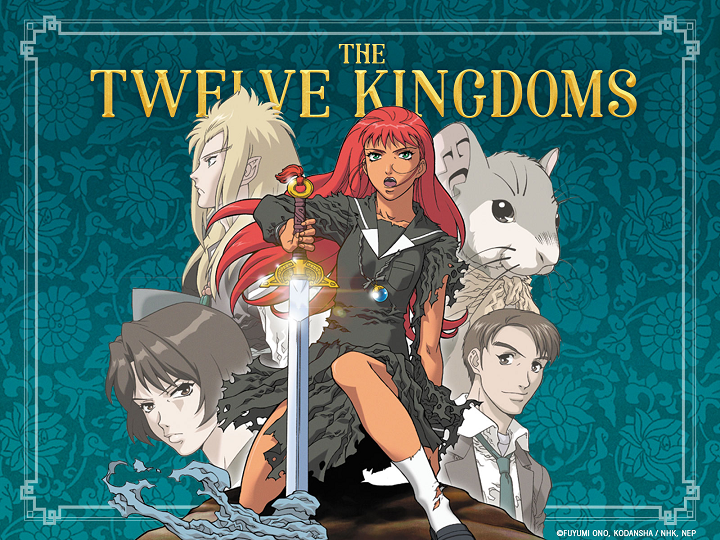
In this day and age it is nigh-impossible to find a season of anime without an Isekai. From Konosuba and Slime Isekai to Sword Art Online and Re:Zero, they have invaded the medium. But the genre existed long before these more modern takes. .Hack//Sign did videogames almost a decade before SAO released its first light novel. Meanwhile Inuyasha did the same for fantasy worlds. Predating all of these though we have what can only be called an Epic in scale. Produced by Studio Pierrot during their golden years and directed by Tsuneo Kobayashi, I give you Twelve Kingdoms. Spanning 45 episodes, Twelve Kingdoms adapts the first 3 of 9 novels written by Fuyumi Ono. Novels which are still releasing to this day and that I would relate to Robert Jordan's Wheel of Time in scale and influence.
If that doesn't excite you, doesn't make you want to hear more about this incredible series, then be gone I say! But if your interest is piqued and you want to hear about this fantastical world and Nakajima Youko's role in it? Then read on, and lets dive right into it!
(Disclaimer: I am working to make 50 the new "average". 70 is not an average score people. 70 is above average. Carry on.. You can also find individual episode write ups and comment on this review on my Star Crossed blog.)
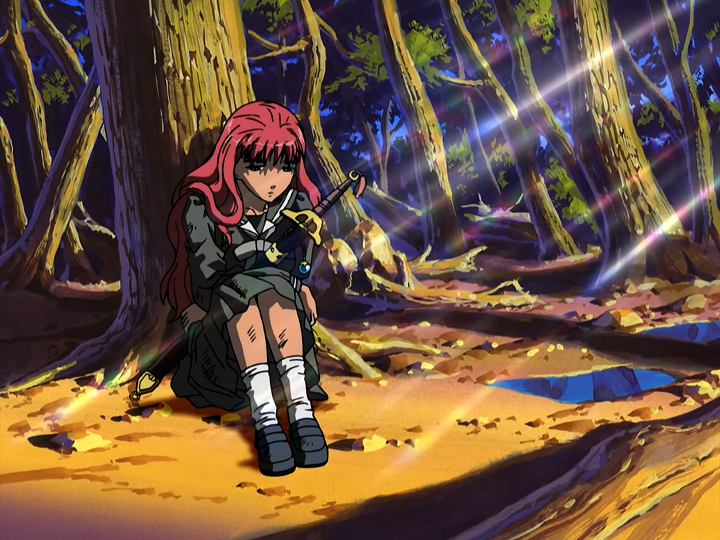
Animation/Art Starting off, Twelve Kingdoms is not what I would call "well animated". Sure, you will occasionally get a nice and crisp cut during the occasional battle scene. But by and large Twelve Kingdoms relies heavily on static shots for its presentation, the battles basically being a coin-flip on quality. Luckily though, Twelve Kingdoms isn't the sort of show that needs heavy animation, it isn't a kinetic series. This isn't a battle Shonen or an action drama, the battles themselves are often the least important events in the story. Rather, Twelve Kingdoms is much more picturesque in it's presentation. It focuses more on striking and memorable scenes that stick in your mind. Think of it like going for wallpaper photos instead of gif-able sequences. It's not something you often find in modern anime production, at least not as successfully as you will here.
This leads me to the general art direction, the bedrock of Twelve Kingdoms' presentation. By and large I found both the color design and general art style to work quite well. Its colorful, but not in the modern moe sense. It's not all pinks and reds and bright blues. Rather it's the harsh orange of dawn, the soft blue of moonlight or a green tint after a storm. And when it really wants to make a scene pop, Twelve Kingdoms will crank up the saturation. This makes the scenes stand out from our own world and really sells the fantasy aspect. This is in no small part helped by the background art of Hiroki Matsumoto, who you can often find working as Art Director on some of your favorite series today.
What sells it for me though is the composite. The art of merging two images and making them feel like they inhabit the same world, like they belong with each other. This can include depth and lighting, but also things like relative speed between foreground and background or layering. If you are interested in a more detailed explanation there is a fantastic article on it over at washiblog. Back to the review, Twelve Kingdoms does a pretty good job at this. The lighting matches beautifully, sizes fit and the characters feel like they actually inhabit this world. It cheats sometimes of course, having them fly in the air or only showing their upper body. But the end result is really all that matters, and it was very rare for Twelve Kingdoms to take me out of story with its composite. The art style did that more than anything else.
You see rarely, very rarely, Twelve Kingdoms goes through an art style change. It's only ever for an episode, or even a few scenes, at a time. But when it does it's very noticeable. Designs shift, they become softer, face proportions become... off. I can't say for sure but it feels like these episodes were outsourced, or deemed less important. That or they had a B-Team to handle the occasionally episode. This isn't a huge misstep, it only ever happens between the big plot points and never really impacted my enjoyment of the show. But it did happen, and it was noticeable. All in all though I think Twelve Kingdoms can often be visually striking, but rarely particularly well animated.
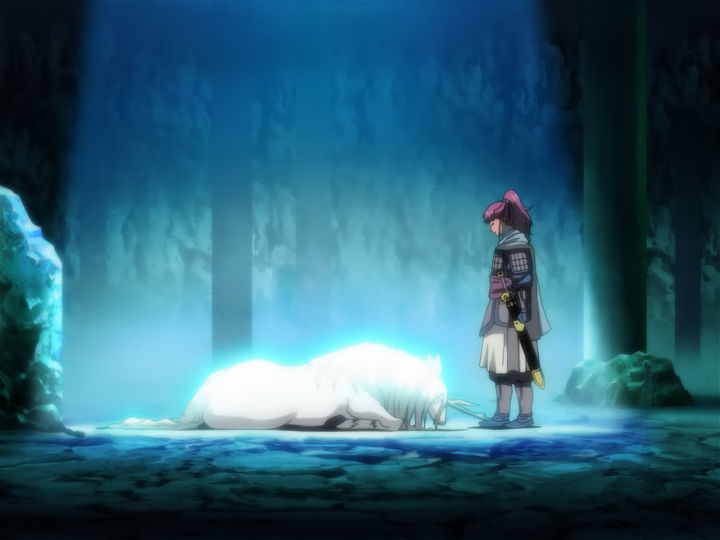
Direction This brings me to the series direction, which is where Twelve Kingdoms true visual strength lies. Previously, I described this series as "picturesque" rather than "kinetic". Relying on well framed and blocked shots rather than moment to moment movement. Examples of this include episode 11, where Enki is framed closer to the camera, making him appear larger despite being a much smaller character, on such a small boat. Or the image directly above using the moonlight to spotlight Nakajima and Keiki, Keiki himself stuck between a rock and Nakajima, framing him in the center. You can see examples of Kobayashi's framing all throughout this post and its some good stuff. In particular I enjoy when Kobayashi is allowed to get surrealist, such as during some of Nakajima's dreams or visions. These are truly some of the most striking sequences in the series.
I would love to be able to say more, but I am no expert on cinematography. So in place of expertise and knowledge, I will use examples. Screenshots from the shows runtime and a few words about why I enjoy them. Take for instance this shot of Kourin's ring, blood pooled around it. The dangers all around from which she tries to protect King Kou, as it begins to seep inside. Or this wide, both establishing the location and just how impossible Suzu's task of cleaning really is, serving double purpose. I think those both get the point across, but this last one should be a final straight forward example. How it uses the design of the window to focus on and emphasize the importance of the messenger bird before it takes flight. These are all small, but they stack up through Twelve Kingdoms' runtime to really enhance the experience.
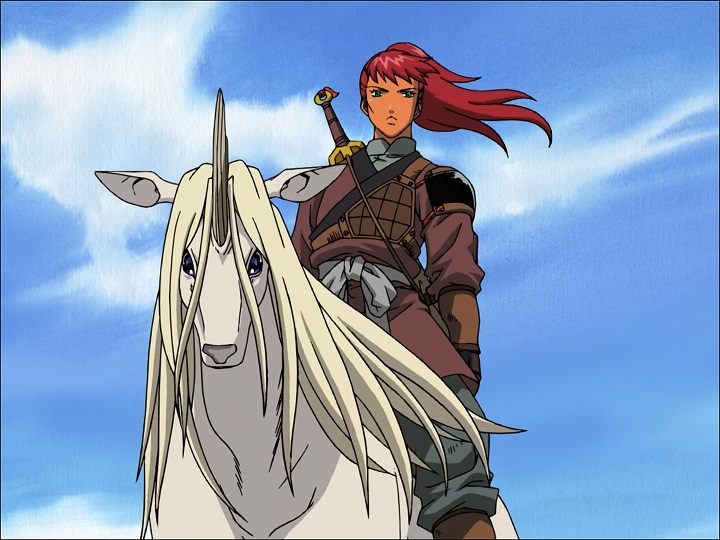
Setting/Story Next we come to what is simultaneously Twelve Kingdoms' greatest strength and weakness, the setting/story. Setting wise, I can't think of another anime with a world as well realized as this. Twelve Kingdoms goes through incredible effort to establish this world and it shows. Everything from how childbirth differs from our world to the geopolitical situation has been well thought out, along with their relationships to each other. Take how our leads are treated on their appearance to this world: Normally in Isekai, this sort of event is unheard of. But in Twelve Kingdoms its a common enough occurrence that there are local laws about how to deal with them. How to handle the language barrier, their place in society, even the inventions they bring along with them such as Buddhism or printing. Their effect on this world is very well thought out, as is everything else.
The downside to how detailed and thought out this setting is though is the burden it puts on the viewer. Often, especially early on, you are bombarded with what is basically technobabble for a fantasy world. Kaikyaku, Kirin, Taiho, Chousai, Hanjyuu, Hourai, Nyokai, the list goes on. To say you need a dictionary for this series isn't as facetious as it sounds and this can often get in the way. Imagine being caught up in a scene, a conversation, and suddenly having to remember a specific piece of vocabulary from 10 episodes back. Once you get used to it and come to recognize these terms, it's not so bad. That Nakajima has to do the same thing, that we share in the leads struggle, is helpful to. But it can definitely make for an awkward moment or take you out of a scene until you come to recognize them.
Story wise, Twelve Kingdoms is in much the same predicament. The narrative truly is fantastic, in no small part due to the characters whom we will get to later, and is definitely worth your time. Every single arc but the last was an incredible experience. The pacing was perfect, slowly building everything up while still telling smaller episodic stories throughout. Many of these arcs start off slowly, and I will admit to not being immediately gripped by them. But every time, without fail, Twelve Kingdoms managed hook me all the way to the end. All it took was one magical moment early in each arc for me to see what it was trying to do. This is because no arc in Twelve Kingdoms is the same, each one approaching a new problem in a new way. Forcing you to look at the world, and its characters from a different angle.
Sadly, while the story is fantastic, it does suffer from one major flaw: It doesn't end. As I said at the top of this review, Twelve Kingdoms is based on a novel series. One that is still releasing to this day, with each arc effectively being a new novel. In that sense each arc gets an ending, and the series as a whole gets a rather strong finale in episode 39. But that still leaves 6 episodes and 5+ novels to tell. I'm sure you can see the problem. I am not sure if Twelve Kingdoms was canceled unexpectedly or if something went wrong in the planning stage. But the series truly ends in episode 39, at the end of the second novel, with last 6 episodes feeling... well, largely like a waste. The last episode of the entire series is a recap for goodness sake.
That said, even with this disappointing final arc, the rest of the narrative is without a doubt worth your time. Its so strong, and so incredible, that even with 6 wasted episodes I cannot help but recommend it to people.
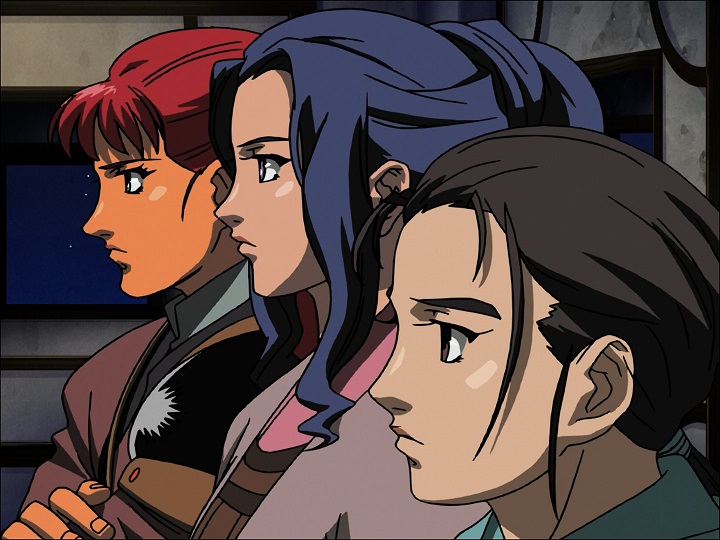
Characters With the narrative covered we can talk about Twelve Kingdoms' incredible characters. And the best way to start this off is with one of the best female protagonists I have ever seen in anime: Nakajima Youko, played by Aya Hisakawa. Like most of Twelve Kingdoms' content, Nakajima's journey is a slow but purposeful one. We see her start as this entitled and naïve girl, one who tries to please everyone without ever being "Nakajima". But over the course of her incredible journey, through the hellish lows and beautiful highs, we see her transform into a queen. One worthy not only of respect, but fealty. Nakajima's story gets better after this, as she learns how to rule, how to lead, and how the right answer is not always the most just. And while Nakajima may be the best character in Twelve Kingdoms, she does not stand alone in this incredible cast.
The rest of Twelve Kingdoms cast starts small and grows from there. Alongside Nakajima we are introduced to Sugimoto and Asano, two other students from Japan who are sucked into this world alongside her. During their journey both serve as a window of sorts into Nakajima's character. Sugimoto attempts to become the "chosen one" of all Isekai stories, despite being nothing of the sort, contrasting Nakajima's desire to blend in and return home. Meanwhile later on Asano and his inability to integrate into this new world becomes a perpetual reminder of where and just how far Nakajima has come. All the while both get their own arcs of finding their place, discovering who they are and of growth. What makes them even more impressive however is that both are, effectively at least in Sugimoto's case, anime original characters. They speak to just how well director Tsuneo Kobayashi understood this work.
And yet still, they are not alone, as this makes up but a fraction of Twelve Kingdoms cast. There are many I can't talk about, such as Shoukei or Suzu, Rakushun or Enki, for fear of spoiling you. But each and every one is given focus, depth, a story beyond what most lead characters get in anime. They don't simple have an arc and are never heard from again. Rather, their arcs play out in conjunction with everyone else's over large spans of time. Growth in one character is directly contrasted to another, relationships form and change to reflect who characters become, rather than staying static despite great conflict between them. The best way I can sell it is this: I absolutely hated Shoukei and Suzu when they first appeared and I doubted their arcs. Yet by the end, they became my favorite trio of characters in the whole show.
Simply put, to say that Twelve Kingdoms cast is large, complex and compelling is an understatement. It truly has not just some of the best female characters in anime, but some of the best period. Sure, they are not without fault. I think Keiki could do to be a bit less stiff, or Shouryuu given a bit more flak for his lackadaisical attitude. But at this point that isn't me criticizing how they are written. Rather, it is me viewing them as people, complex ones with wants and desires of their own. Their arcs aren't perfect, and the presentation does occasionally let them down here and there. But the writing almost never does and that is worthy of praise in my book. I can only hope that one day we get to see the conclusion of their stories.
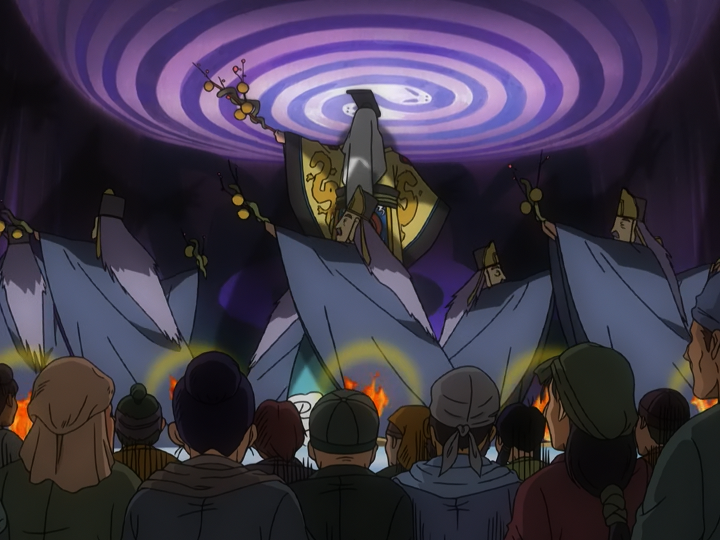
OST/Sound Design Finally we come to the OST and sound design, always the hardest section to try and judge! On initial viewing, Twelve Kingdoms OST sounds surprisingly simple. It makes for good background and travel music, and I especially like the Chinese influence which also permeates the rest of the setting. But it was only after listening to the OST in full did I discover something great: Twelve Kingdoms OST is not a large number of small, simple tracks. Rather it is a small amount of complex tracks that cover a wide range, with different parts of each track being used in different scenes. Many times I found songs that I originally thought were separate pieces but in actually were different parts of the same song. If this sounds bad, how can songs sound so drastically different and still work, I understand, I was surprised to. But here are a few examples.
Take for instance "Kuni-Touhoureiin", which starts primarily as a strings piece before shifting into flutes, then a rolling drum and finally back to strings. I initially thought when watching that each of these came from a different track. Yet when combined, when allowed to listen to the transitions between them, they work beautifully. You can see this as well in "Ifuuoukei" where it starts with a low flute before transitioning into more combative strings and drums. Really selling the shift from everyday doldrums to war and violence. Not to mention pieces such as "Getsumeifuuei" that have multiple versions. One with a slow and contemplative vocals and another with faster paced and more active singing. Its the same song, but the pace and way each are played make them feel unique, especially when you hear how they are used in the show itself. All in all, Twelve Kingdoms OST is fantastic.
Meanwhile the actual sound design is pretty good as well. I can't think of any moments where I was taken out of a scene by the sounds. That said, nothing really stood out to me either. The OST does a lot of the heavy lifting when it comes to setting a scene while actual environmental sounds are usually pretty basic. You may get a steady background of crickets at night, or wind perhaps, but nothing particularly unique or reactive to the scene. Basically, Twelve Kingdoms sound design is... acceptable. It won't blow your mind, its not going to inspire the same way Hajime no Ippo's jet engine punches and screeching tire footwork does. But it also won't ruin your immersion. And for as much as the rest of the show does, that's good enough.
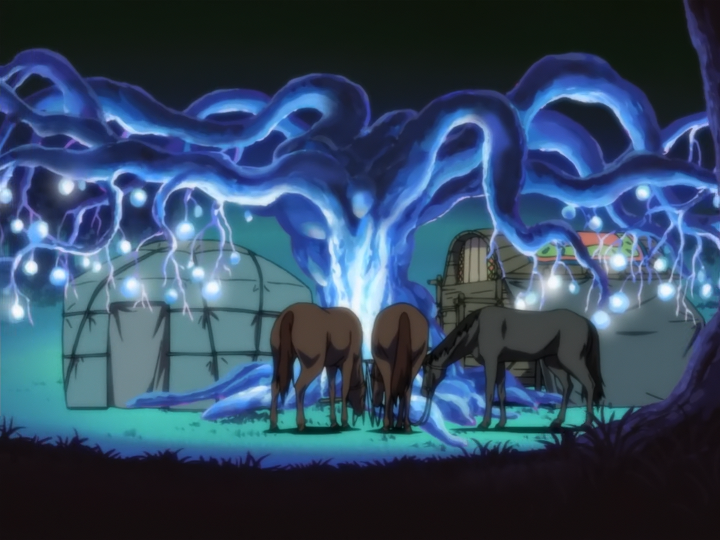
What Isekai have lost: Old vs New Now we come to the personal part of the review, where I wax poetic about some tangentially related topic. This doesn't effect the final score at all. It only exists to let you readers into my head and to try and explain where my head is at, without the burden of reviewing anything. If that doesn't work for you, or you don't care, then go ahead and skip to the conclusion. For those that are curious, lets talk how Isekai have changed!
Despite what some newer anime viewers may think, Sword Art Online did not invent the Isekai genre. It wasn't even the first video game Isekai, with the .Hack// series and Digimon predating it, just to name two. What SAO did do though was bring it back to modern viewers and with that basically rewrite what the genre was about. Suddenly Isekai was a power fantasy, and I didn't like it. Now the focus was about who was stronger, about harems and wish fulfillment. Characters came to these new worlds with escapist fantasies about being important despite never actually doing anything in the real world. This is the exact kind of character, of world view, that Twelve Kingdoms criticizes through characters like Sugimoto. Suddenly, Isekai was no longer about criticizing our world and our lives through a fantasy lens, but about escaping it.
Compare this to my first Isekai, .Hack//Sign, and its lead Tsukasa. Tsukasa didn't have a harem nor was he really a hero. More than anything Tsukasa is a victim and the story itself is centered around personal growth rather than any world-ending events. The videogame of .Hack//Sign isn't used as a substitute for reality, but rather an extension of it. Actions in the game have consequences in reality, characters have lives and relationships outside the game and it explores how these anonymous people you meet online are living, breathing, complex people. Twelve Kingdoms does something very similar. When Nakajima comes to this world, her problems from Japan don't disappear. Rather they come with her and this new world only reveals and brings them to the forefront. It forces her to confront who she was and grow, rather than run away from her problems like many Isekai do now.
Basically my issue with Isekai today is that they are no longer about growth. Yes, occasionally one comes along that remembers this. But by and large the genre is dominated by escaping reality rather than reflecting it. The characters travel to other worlds to get away from their problems, to avoid growing as people. Similarly the worlds themselves are all the same brand of Tolkien fantasy. Gone are the complex settings such the twelve kingdoms and the Void Sea, or the fully realized bath house of Spirited Away. Maybe I am asking to much with this. Maybe the genre has forever changed, and the time of epic fantasy and real world analogues has past. But if so I can at least remember that time with series such as Twelve Kingdoms.
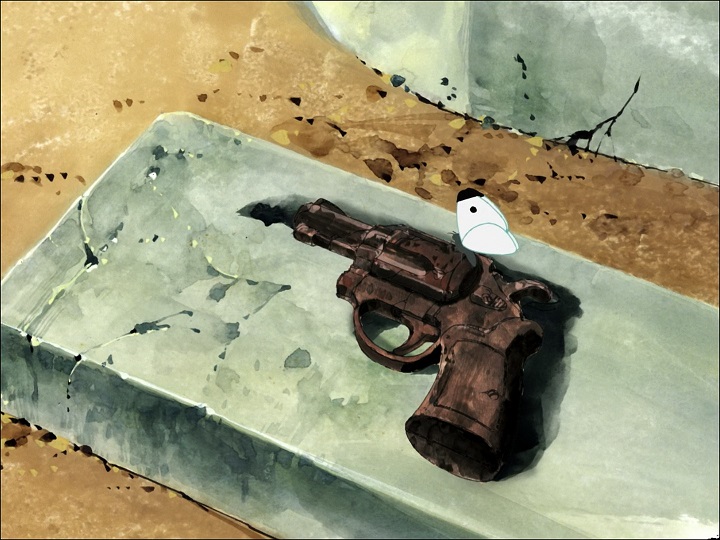
Conclusion So with all that, when everything is said and done at the end of the day, how was Twelve Kingdoms? As a journey, it was incredible. Every arc but the last did a great job of bringing these characters to life. Of showing me what it was like to adapt to and live in this world. The characters are also some of the best I have seen in a long time, with Nakajima handily earning her place as one of the best female protagonists in anime. The worst thing I have to say about it is that the true ending comes 6 episodes before the finale. Episodes 40-45 are easily the weakest in the anime and Twelve Kingdoms could be said to end on episode 39. And yet even despite this, I can't help but want more. So is Twelve Kingdoms good? Yes. Should you watch it? Absolutely.
If you want to leave a comment you can do so here or find me over on twitter. Thanks for reading!
SIMILAR ANIMES YOU MAY LIKE
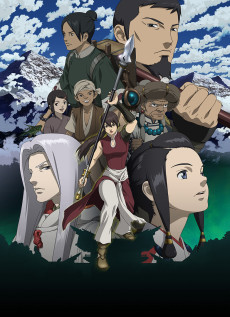 ANIME ActionSeirei no Moribito
ANIME ActionSeirei no Moribito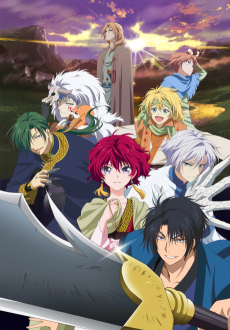 ANIME ActionAkatsuki no Yona
ANIME ActionAkatsuki no Yona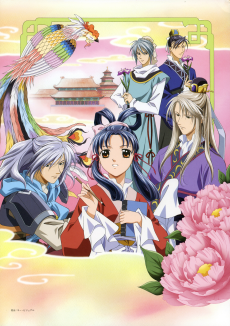 ANIME AdventureSaiunkoku Monogatari
ANIME AdventureSaiunkoku Monogatari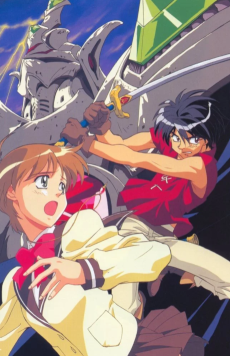 ANIME AdventureTenkuu no Escaflowne
ANIME AdventureTenkuu no Escaflowne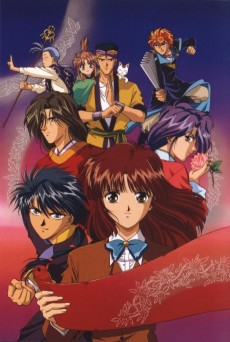 ANIME AdventureFushigi Yuugi
ANIME AdventureFushigi Yuugi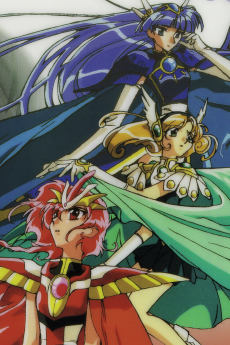 ANIME AdventureMagic Knight Rayearth II
ANIME AdventureMagic Knight Rayearth II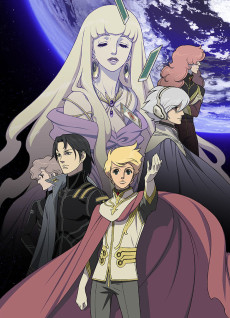 ANIME ActionTerra e... (TV)
ANIME ActionTerra e... (TV)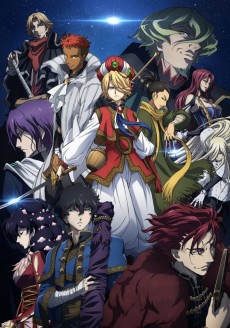 ANIME AdventureShoukoku no Altair
ANIME AdventureShoukoku no Altair ANIME AdventureDeltora Quest
ANIME AdventureDeltora Quest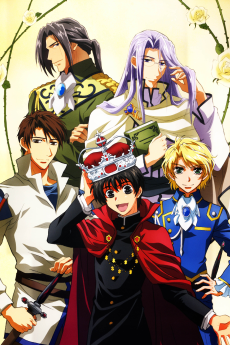 ANIME AdventureKyou kara Maou!
ANIME AdventureKyou kara Maou!
SCORE
- (3.85/5)
TRAILER
MORE INFO
Ended inAugust 30, 2003
Main Studio Studio Pierrot
Favorited by 735 Users

